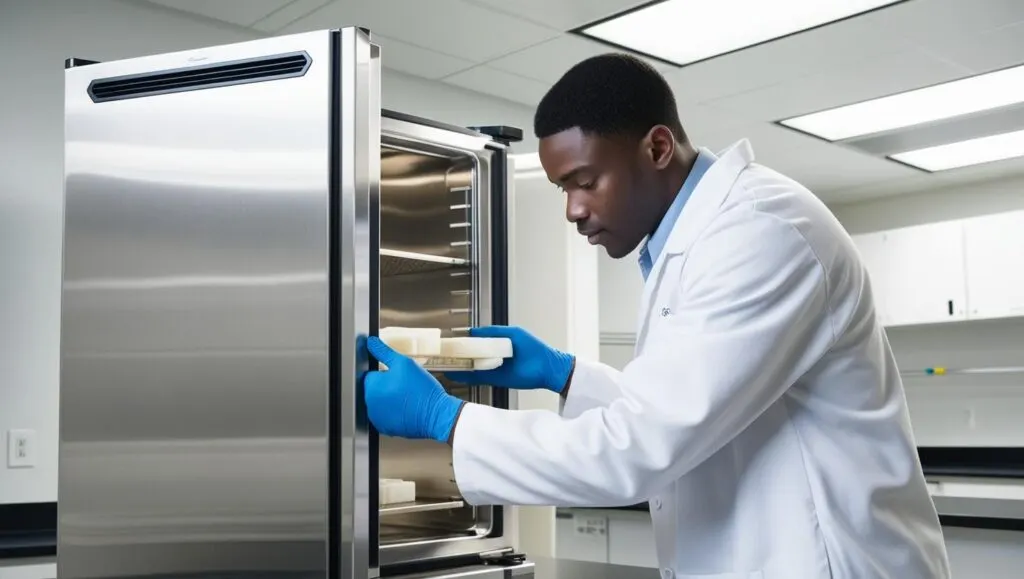Laboratory freezers are essential for preserving biological samples, reagents, and temperature-sensitive materials. Choosing the right laboratory freezer ensures sample integrity and long-term reliability. Factors such as temperature stability, storage capacity, and energy efficiency play a crucial role in selecting the best model for your application.
At Apex Scientific, a trusted laboratory equipment supplier in South Africa, we offer a range of low-temperature freezers by Antech Scientific designed to meet diverse research and industrial needs. Whether you’re looking for a -25°C freezer for general laboratory use or a -60°C freezer for ultra-sensitive materials, this guide will help you make an informed decision.
Understanding Laboratory Freezer Temperature Ranges
Different applications require specific temperature ranges to maintain sample integrity. Below is an overview of common laboratory freezer categories:
- -25°C Freezers – Ideal for routine laboratory storage, including reagents, enzymes, and some biological samples.
- -40°C Freezers – Suitable for long-term storage of vaccines, pharmaceutical products, and biological materials.
- -60°C Freezers – Designed for deep freezing of cells, tissues, and other critical biological specimens.
Each category serves distinct purposes, and selecting the correct temperature range ensures proper preservation of valuable samples.
Key Factors to Consider When Choosing a Laboratory Freezer
1. Temperature Stability and Uniformity
Consistent temperature maintenance is vital to prevent sample degradation. Fluctuations can compromise stored materials, making temperature uniformity a top priority. The Apex Scientific -40°C Deep Freezer provides precise cooling, ensuring stability across all compartments.
2. Storage Capacity and Organization
Laboratory freezers come in different sizes and configurations to suit various storage needs:
- Upright Freezers – Ideal for easy access and organization. Models like the Apex Scientific -40°C Labsafe Freezer include baskets and divided doors for efficient sample management.
- Chest Freezers – Offer superior cold air retention, reducing temperature fluctuations when opened. The Apex Scientific -60°C Chest Freezer is an excellent choice for long-term storage of sensitive materials.
3. Energy Efficiency and Cooling Technology
Modern laboratory freezers feature advanced compressors and insulation to optimize energy efficiency while maintaining consistent temperatures. Well-insulated units, such as our -40°C Deep Freezer, minimize energy consumption and lower operational costs.
4. Door Design and Accessibility
The type of door impacts cold air retention and accessibility:
- Divided Doors – Minimize temperature fluctuations by allowing selective access. Found in the Apex Scientific -40°C Deep Freezer.
- Standard Doors – Provide full access but may lead to more significant temperature shifts.
- Chest Freezers – Retain cold air better than upright models, making them more energy-efficient.
5. Safety Features and Alarm Systems
A reliable laboratory freezer should include:
- Temperature alarms to notify users of fluctuations or power failures.
- Locking mechanisms to prevent unauthorized access.
- Battery backups to maintain alarm function during power outages.
Applications of Low-Temperature Freezers
Laboratory freezers are used across various industries, including:
- Biomedical and Clinical Research – Storage of blood samples, tissues, and vaccines.
- Pharmaceutical Industry – Preservation of drugs and reagents.
- Industrial and Environmental Applications – Safe storage of sensitive materials requiring stable temperatures.
Comparison of Laboratory Freezers
| Feature | -25°C Freezer | -40°C Deep Freezer | -40°C Labsafe Freezer | -60°C Chest Freezer |
| Best For | General lab storage | Long-term biological storage | Heavy-duty applications | Ultra-sensitive materials |
| Storage Type | Upright | Upright (baskets & divided door) | Upright (ULT carcass) | Chest |
| Cold Air Retention | Moderate | Good | Excellent | Best |
| Application Areas | Routine lab use | Biotech, pharma | Clinical, industrial | Advanced research, Tuna |
Choosing the Best Laboratory Freezer for Your Needs
Selecting the right laboratory freezer depends on:
- Required temperature range (e.g., -25°C freezer vs. -60°C freezer)
- Storage needs (e.g., chest vs. upright freezer)
- Energy efficiency and cost considerations
At Apex Scientific, we supply a wide range of low-temperature freezers tailored to different laboratory applications. Whether you need a -40°C Deep Freezer with built in baskets or a robust -40°C Labsafe Freezer, we can help you find the perfect fit.




